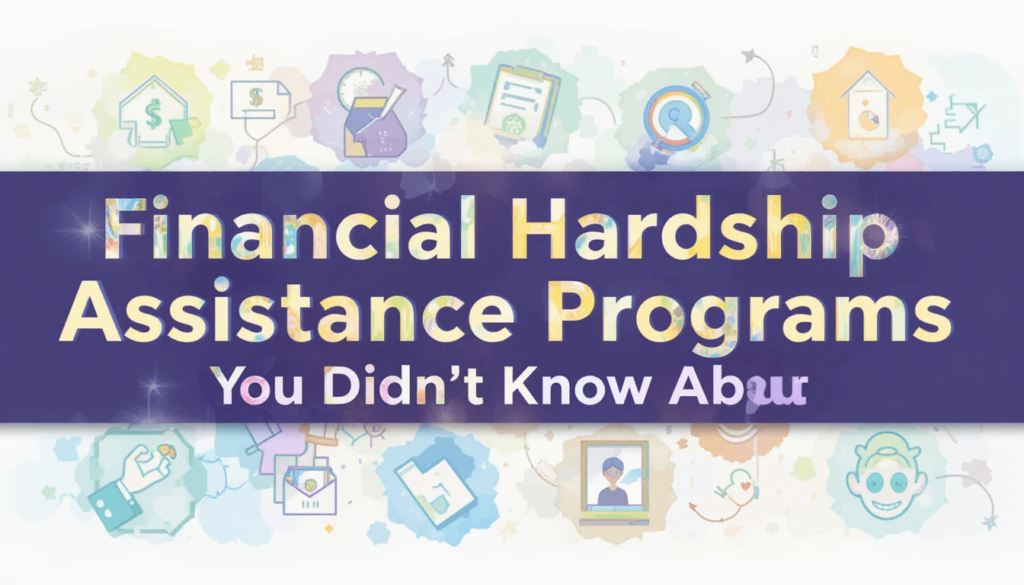like, “Real Housewives of Wherever” real, but actually real. You know that feeling, right? That gut-punch moment when you look at your bank account, then at the pile of bills, and your stomach just Financial Hardship drops? And you realize, oh crap, I am officially in a pickle. A big, sour, terrifying pickle. I’ve been there. More times than I’d like to admit. And for the longest time, I thought I was totally alone, just flailing around, trying to figure out how to keep the lights on and my cat in kibble (the struggle is real, people!).
It’s during those stomach-dropping, silent-scream moments that your brain starts conjuring all sorts of wild ideas. “Maybe I can sell that weird lamp Aunt Mildred gave me?” “Is blood plasma still a thing?” “Do I actually need all my organs?” It gets dark, fast. And then, you might, just might, start Googling “help with bills” or “emergency money.” And that’s when you often stumble upon the same old, tired advice, or worse, those shady cash advance loans we talked about last time. But what if I told you there’s a whole universe of financial hardship assistance programs out there that you probably didn’t even know existed? Because, dude, there totally is. And it’s a game-changer.

My Personal Tangle with the Financial Monster (and the Shame Wall)
Okay, so my story isn’t unique, but it felt pretty darn personal at the time. A few years back, I got hit with a double whammy. My car decided to give up the ghost (RIP, trusty Honda Civic, you were a noble steed), and then, like, a week later, my hours at work got unexpectedly cut. Poof. Just like that. Suddenly, my carefully constructed budget (which was already held together with duct tape and wishful thinking) imploded. Rent was due. Car payment was due. My cat, Mittens, looked at me with those judging eyes that clearly said, “Where’s my fancy salmon pate, human?”
I remember sitting on my couch, surrounded by overdue notices that felt like personal attacks, just staring at the wall. My brain was a static mess. And the shame. Oh, the shame. We live in this society where everyone’s supposed to be crushing it, right? Hustling, thriving, posting aesthetic avocado toast pics. Nobody posts about barely making rent or having to choose between fixing their car and buying groceries. So, you feel like a total failure. Like you should know how to handle this. You should have an emergency fund the size of a small country. You shouldn’t be in this mess.
And that shame? It builds a wall. A giant, impenetrable wall around you, keeping you from reaching out. Because who wants to admit they’re struggling? Who wants to look like they’re not “adulting” correctly? But lemme tell ya, that shame is a liar. It’s a sneaky little monster that keeps you isolated when what you really need is help.
I spent days just feeling absolutely paralyzed, tried calling my landlord, but my voice was shaky, and I mumbled something incoherent. I almost called my mom, but then I remembered that time she told me I should “save for a rainy day,” and I just… couldn’t. My pride was a tiny, fragile little bird, and I couldn’t risk it being squashed.
But then, out of sheer desperation, I started digging. Not just surface-level digging, but serious, late-night, coffee-fueled digging. And that’s when I started to uncover some incredible stuff. Stuff I truly, honestly, hand-on-my-heart-swear-to-you, had no clue about.
The Big Revelation: Programs You Actually Didn’t Know About
Alright, buckle up, because this is where it gets interesting. Beyond the obvious food banks and unemployment benefits (which are super important, don’t get me wrong!), there’s a whole underground network of support. It’s like a secret society, but for helping people who are just trying to keep their heads above water.
Utilities: More Than Just LIHEAP
Everyone knows about LIHEAP (the Low Income Home Energy Assistance Program), right? It’s awesome. But did you know many individual utility companies have their own assistance programs? No joke!
- Medical Baseline/Life Support Programs: If someone in your household has a serious medical condition that requires a lot of electricity (like oxygen machines or a ventilator), your utility company might offer a special lower rate or even additional assistance. It’s not just for people in wheelchairs, it could be for folks with certain chronic illnesses.
- Crisis Funds: Some utility providers have specific funds set up (often funded by customer donations, which is pretty cool) for one-time emergency assistance to prevent shut-offs. You gotta call and ask, but it’s worth it. My friend, who’s diabetic, found out her electric company had a special rate because her insulin needed constant refrigeration. Total mind-blow!
- Negotiated Payment Plans: This isn’t a program, but it’s a huge one. Call them. Seriously. Even if you’re already behind, talk to them. They’d rather work with you than get nothing.
Medical Bills: The Silent Killer
This one hits hard for so many. A surprise trip to the ER can wreck a budget faster than a toddler with a permanent marker. But here’s the secret:
- Hospital Charity Care/Financial Assistance Policies: By law (for non-profit hospitals, anyway), they have to have these policies. If your income is below a certain threshold, they might write off part or all of your bill. You have to apply, and it can be a pain, but it’s worth it. That $5,000 bill? Could be $500. Or $0. Ask for the financial aid department. Always.
- Patient Assistance Programs (PAPs): If you’re struggling to pay for prescription medications, pharmaceutical companies often have PAPs that provide free or low-cost meds to eligible patients. Your doctor’s office often has info on these, or you can check directly on the drug manufacturer’s website.
- Negotiate, Negotiate, Negotiate: Seriously, medical bills are almost always negotiable. Ask for an itemized bill. Challenge charges. Offer to pay a lump sum for a discount. It’s like a bizarre, high-stakes garage sale.
Housing Stability: Keeping a Roof Over Your Head
Losing your home is terrifying. But there are layers of protection:
- Emergency Rental Assistance Programs (ERAP): These cropped up big time during the pandemic, but many are still active! They’re usually run at the state or county level and can cover back rent, future rent, and even utility bills. You gotta search for your specific county/city program.
- Homelessness Prevention Programs: These are often run by local non-profits or housing authorities. They can help with things like security deposits, first month’s rent, or even mediation with landlords.
- Specific Aid for Veterans, Seniors, or Families with Kids: Organizations like Volunteers of America, Salvation Army, and local family service agencies often have targeted housing support.
Food Security: Beyond the Food Bank Line
Food banks are a godsend, but there’s more to it:
- SNAP (Supplemental Nutrition Assistance Program) / WIC (Special Supplemental Nutrition Program for Women, Infants, and Children): These are federal programs for groceries and specific nutritional items. Don’t feel ashamed to apply. These programs exist for a reason.
- Community Fridges: This is a cool, grassroots movement. People leave food, people take food. No questions asked. Check social media groups or local directories for ones near you.
- School Meal Programs: If you have kids, make sure they’re enrolled in free or reduced-price lunch programs. It’s a huge help.
Niche, “Huh?” Programs You Might Not Expect
This is where the real deep dive comes in. There are so many specific organizations out there:
Car Repair Grants: Less common, but some local charities or workforce development programs might offer small grants or low-interest loans for essential car repairs if it impacts your ability to work.
Disease-Specific Foundations: If you have a specific illness (like cancer, multiple sclerosis, etc.), there are often foundations that provide financial aid for treatment, living expenses, or even transportation to appointments.
Artist/Performer Relief Funds: If you’re in the arts, many unions, guilds, and non-profits have emergency grants for artists facing hardship.
Pet Medical Emergency Funds: Yes! There are organizations like RedRover or The Pet Fund that help with vet bills in a crisis. Mittens, my judgmental feline overlord, approves of this message.

How Do You Find These Hidden Gems? (No Shovel Required!)
This is the key. Because knowing they exist is one thing, but actually finding them when your brain is already fried is another.
- Call 211.org (Seriously, Do It!): This is your absolute BEST friend in a crisis. It’s a nationwide service (a non-profit, not a government line) that connects you to local resources for almost anything. Housing, food, utilities, health care, childcare, veteran services, mental health. Just dial 2-1-1 or visit their website. It’s like a human search engine for help. They know about all the local little programs you’d never find Googling.
- Your Local Government Websites: Go to your county or city website. Look for “Social Services,” “Human Services,” “Community Resources,” or “Housing Authority.” They often have comprehensive lists of local, state, and even federal programs.
- Specific Non-Profit Organizations: If you have a specific need (e.g., you’re a veteran, dealing with a specific illness, or a senior), search for national and local non-profits related to that area.
- Directly Contact Billers: As I mentioned, if you’re struggling with a specific bill (electricity, gas, water, even medical providers), call their customer service number and immediately ask for their “financial assistance,” “hardship program,” or “billing options” department. Don’t be shy.
- Online Search (with better keywords!): Instead of just “help with bills,” try more specific phrases like:
- “Emergency rental assistance [your city/county]”
- “Medical bill forgiveness [hospital name]”
- “Utility assistance programs for seniors [your state]”
- “Free car repair programs [your city]”
The Emotional Side of Asking for Help (It’s Brave, Not Weak!)
Look, I get it. Asking for help feels like defeat. It feels like admitting you’re not strong enough, not smart enough, not enough. But let me tell you something: it’s the exact opposite. It takes incredible courage to face your struggles head-on and say, “I need a hand.” It takes strength to navigate the paperwork and the phone calls when you’re already exhausted.
When I finally reached out and got some help, even just with getting on a better payment plan for my utilities, it felt like a tiny crack in that shame wall. A little bit of light streamed in. And that little bit of light? It makes all the difference, helps you breathe, helps you think. It helps you realize you’re not, in fact, drowning alone.
So, if you’re out there reading this, feeling that familiar dread in your stomach, just know this: You are not alone. There are people, programs, and resources designed to help. You just gotta know where to look, and you gotta be brave enough to ask. Even if your voice shakes a little. Even if your pride takes a temporary hit. Because getting back on your feet? That’s the real victory.
Now go forth, my friend. Go forth and explore. And if you find a program that totally blew your mind, or you have a tip for navigating this stuff, drop it in the comments. We’re all in this wild ride together.
You Might Also Like:
The Great Sock Mystery: Where Do All the Lost Socks Go? (Still Investigating)
My Cat’s Quest for World Domination (and More Salmon Pate)
<a href=”https://www.benefits.gov/benefit-finder” target=”_blank” rel=”noopener noreferrer”>Benefits.gov: Your One-Stop Shop for Government Benefits (It’s Actually Useful!)</a>





